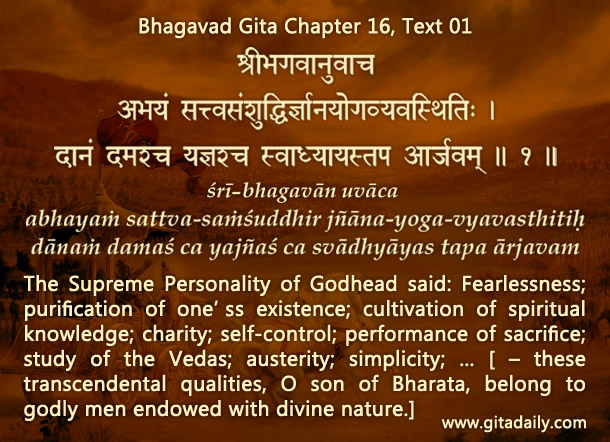Suppose we have the courage of conviction — that is, we are convinced about the greatness of a cause and ready to endure difficulties for that cause. But should our courage of conviction always end in our conviction (punishment)? If we are ready to die for the things that matter to us, our readiness would be lauded as the epitome of courage. Still, is martyrdom in itself always a virtue?
Just because we are ready to die for a cause doesn’t mean we have to die for that cause. If we really consider that cause to be bigger than ourselves, then we need to contemplate how we can best serve that cause. There are times when we can serve our cause by giving up our life. And there are times when we can serve our cause better by staying alive, even if our survival requires some trade-offs in how we pursue our cause.
Therefore, to best serve a cause bigger than ourselves, we need to balance courage with a service attitude. The Bhagavad-gita provides a philosophical foundation for such a service attitude by revealing that we all are parts of a divine reality far greater than ourselves (15.07); that divinity is the supreme benefactor of everyone (05.29); and we can do the best service by acting in harmony with the divine will (18.73). That’s why the Gita commends courage as not just a virtue, but as a virtue reflective of a divine nature (16.01). Simultaneously, Gita wisdom reproaches impulsiveness and recklessness, even if driven by a noble sentiment — it asserts that action in the mode of ignorance involves distress and destruction (18.25) without affecting much transformation in the situation. Guided thus by Gita wisdom, we will recognize that martyrdom is neither the sole nor always the best way of serving a noble cause.
The more we learn to balance courage with a service attitude, the greater will be our impact, both in life and in death.
Summary:
Courage of conviction doesn’t have to end in conviction — contemplate when we can best serve a cause by dying and when by living.
Think it over.
- When is the courage of conviction laudable?
- When might the courage of conviction become questionable?
- How can Gita wisdom help us channel our courage most impactfully?
***
16.01: The Supreme Personality of Godhead said: Fearlessness; purification of one’s existence; cultivation of spiritual knowledge; charity; self-control; performance of sacrifice; study of the Vedas; austerity; simplicity; … [– these transcendental qualities, O son of Bharata, belong to godly men endowed with divine nature.]
Audio explanation of the article is here: https://gitadaily.substack.com/p/conviction-due-to-courage-of-conviction

To know more about this verse, please click on the image

Leave A Comment